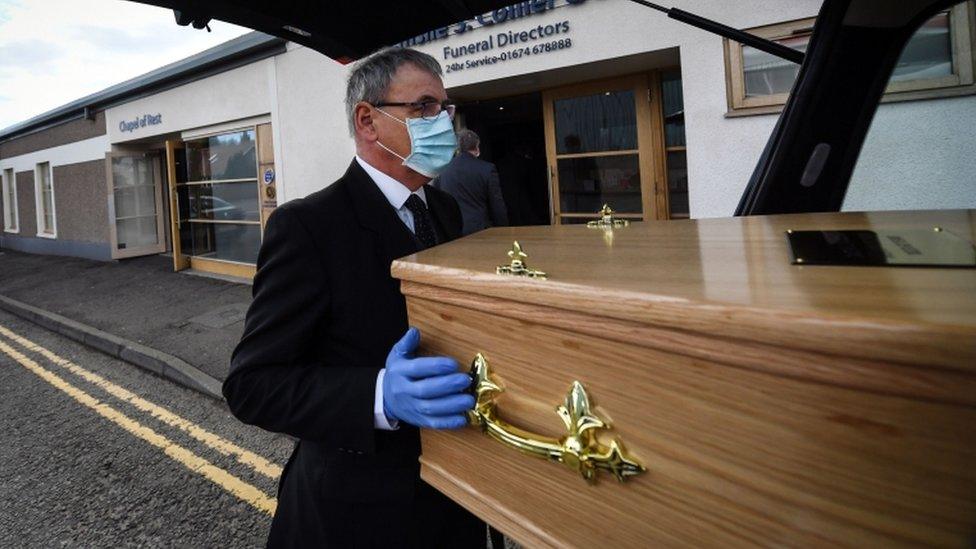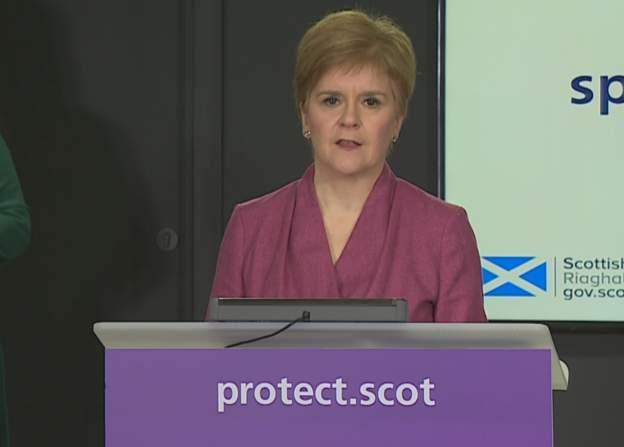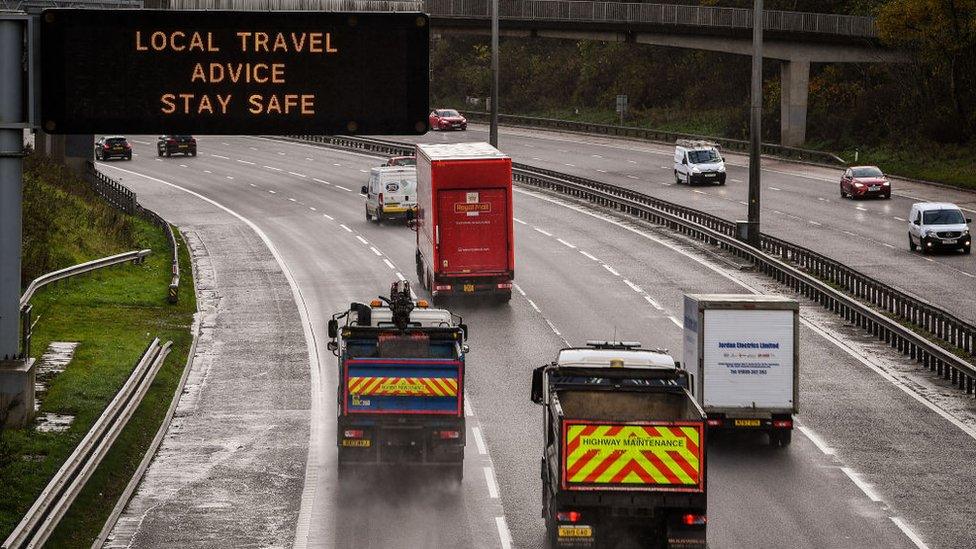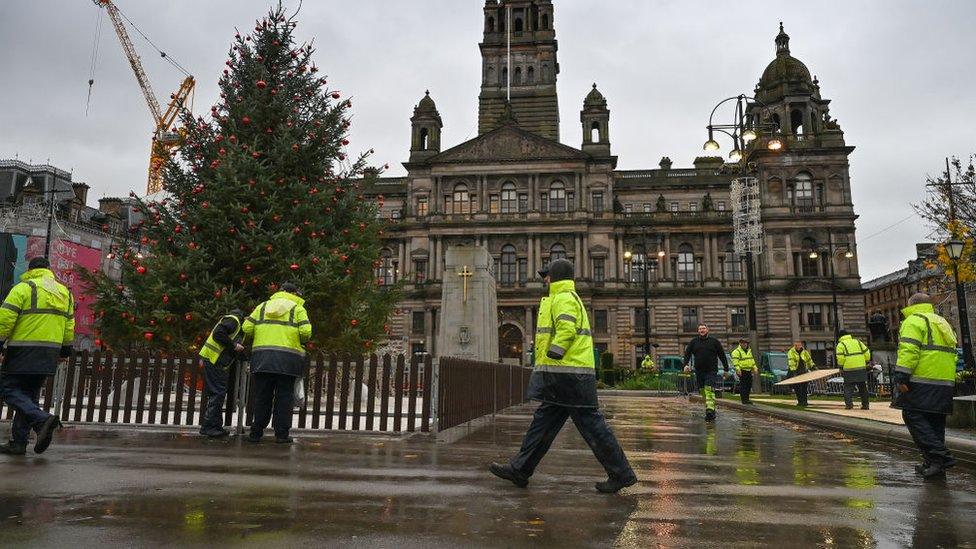Covid: Coronavirus deaths in Scotland pass 5,000 milestone
- Published

The latest figures include 278 people who have died in the last week
The number of people who have died with confirmed or suspected cases of Covid-19 in Scotland has passed 5,000.
Figures released by National Records of Scotland showed that the virus had been mentioned on the death certificate of 5,135 people by last Sunday.
This included 278 people who had died in the previous week.
Scotland announced its first confirmed coronavirus death - an elderly patient in Lothian with underlying health conditions - on 14 March
The 278 Covid-linked deaths recorded in Scotland in the week from 9 to 15 November was an increase of 71 from the previous week.
The majority of deaths - 94 - were people over the age of 75, although there were 33 deaths of people aged under 65.
There were 105 deaths in the Greater Glasgow and Clyde health board area, 63 in NHS Lanarkshire and 31 in NHS Lothian.
Most were in hospitals (198 deaths), with 72 deaths in care homes and eight at home or in non-institutional settings.
Last week, the UK as a whole became the first country in Europe to have seen more than 50,000 people die within 28 days of testing positive for the virus.
The number of people in Scotland to have died by this measure currently stands at 3,377.

Ms Sturgeon said positive news about potential vaccines in recent days meant an end to the pandemic could be in sight
Speaking at her daily coronavirus briefing, First Minister Nicola Sturgeon said the statistics were "grim and distressing".
She added: "When we are through this pandemic we will want to consider how, as a country, we commemorate the lives that virus has taken."
Highlighting more positive news about the Pfizer vaccine, which suggests it is 94% effective in people over the age of 65, Ms Sturgeon said that an end to pandemic was starting to appear on the horizon.
The first minister said: "One of the things we should be focused on now, and all try to play our part in, is how we get to the end of this with as few additional lost lives as possible."
Level four restrictions
More than two million people across 11 council areas in western and central Scotland, including Glasgow, are to be placed in the country's highest level four category of restrictions from 18:00 on Friday.
It will see all non-essential shops close until 11 December, along with pubs, restaurants, gyms and visitor attractions - although schools will remain open.
Some business groups and opposition politicians have questioned the scientific evidence for the move amid warnings that it will hit the economy hard during the crucial festive shopping period.
The Scottish Chambers of Commerce have claimed that financial help put in place by the Scottish government would not even "scratch the surface" of what was needed.
And Scottish Labour leader Richard Leonard told BBC Scotland's Coronavirus Update programme that people needed to understand the rationale behind the restrictions.
Mr Leonard questioned why North and South Lanarkshire were being moved to Level Four when cases there were falling, and accused the Scottish government of sending "mixed signals" about how the levels for each council area were decided.
He added: "I understand the precautionary approach, but there is a calling on government - if they want to secure public consent - to provide all the evidence to persuade people that it is in their interest to follow the advice."

New laws restricting travel in many areas of Scotland are due to come into force on Friday
The Scottish Conservatives have criticised the government for not yet publishing details of new legally-binding travel restrictions that are due to come into force from Friday.
It will be illegal for people in level three or four to travel outside their own council area except for "certain essential purposes", while people in other areas must not travel to level three or four regions.
Scottish Conservative MSP Donald Cameron said: "The first minister has been talking about areas potentially going into tier four for weeks now so there's really no excuse for another delay.
"It's unacceptable to leave people waiting for answers about such basic things as where they can and can't travel.
"These laws must be clear and the SNP must avoid a repeat of the shambles we saw with university students and the mixed messages about what's a café and what's a restaurant."
But Ms Sturgeon again insisted the stricter lockdown rules, including the travel restrictions, were necessary to prevent hospitals and intensive care units from being overwhelmed, and to bring the "stubbornly high" levels of the virus in these areas down in time for Christmas.

The four nations of the UK are aiming to reach a shared approach to Christmas this year
The Scottish government is having talks with governments across the UK with the aim of agreeing a four-nations approach to Christmas so families spread across the UK can still meet up.
The Sun newspaper has reported that families may be able to mix indoors, external for five days from Christmas Eve.
Ms Sturgeon said: "We are all desperate for some normality around Christmas and I absolutely include myself in that.
"The Scottish government right now is working very closely and well with the other UK nations to try to agree a way for that to happen.
"We want to have the same position across the UK given family patterns that exist, but we know that people coming together when a virus is circulating will increase the risks of it spreading."


